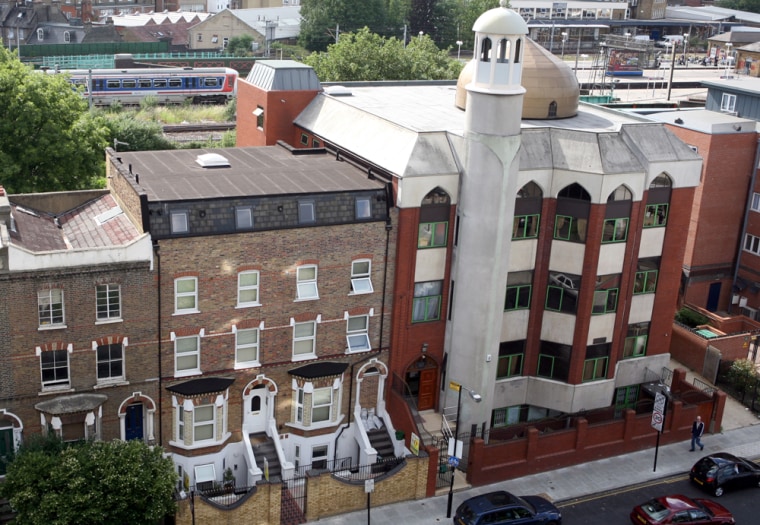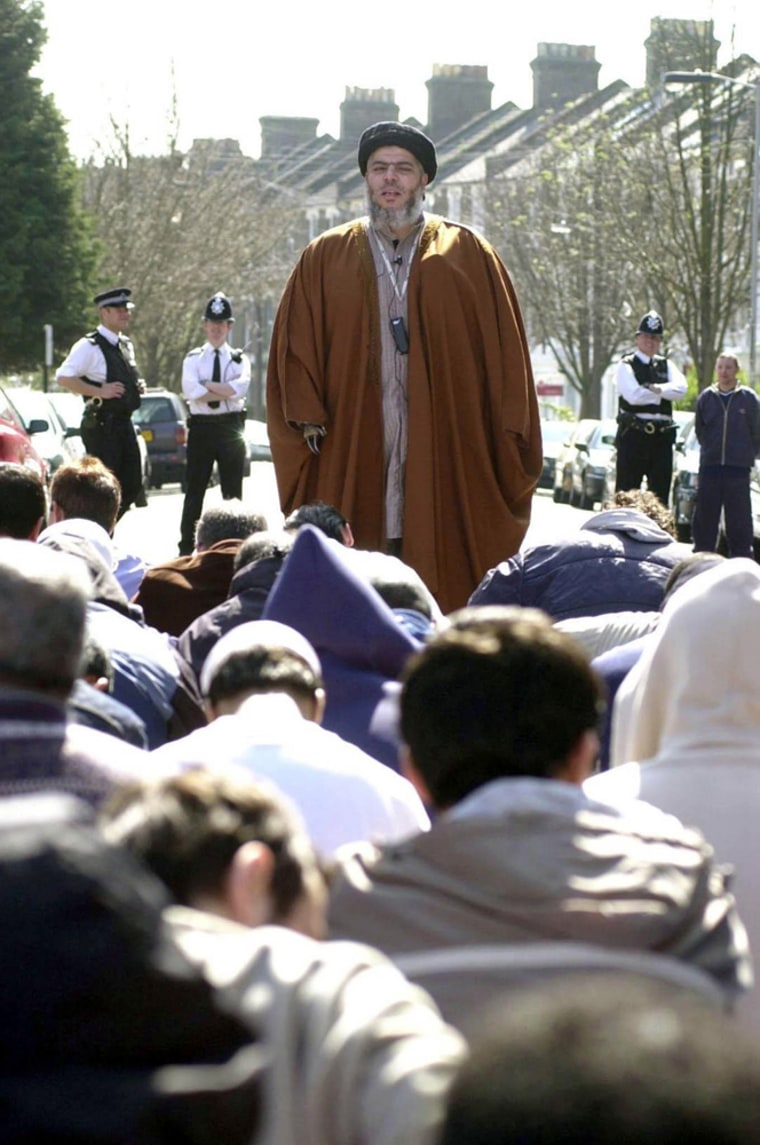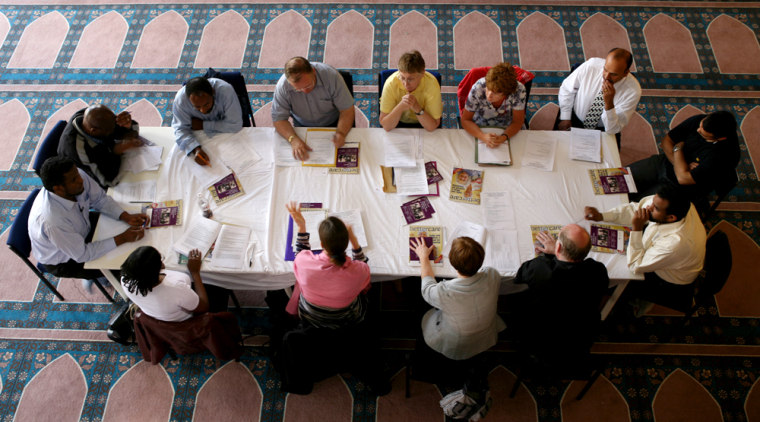LONDON — The Finsbury Park mosque, where the one-eyed, hook-handed militant cleric Abu Hamza al-Masri once delivered his fiery sermons and helped turn a religious facility into the target for dozens of international terrorism investigations, is going through a makeover.
During his time at the helm, Hamza, now sitting in a British prison and awaiting possible U.S. extradition, allowed the mosque to become a haven of radical Islam in Europe — a “suicide factory” as one book has called it — which hosted such figures as Zacarias Moussaoui, Richard Reid and, reportedly, three of the four London bombers.
Now, far from being allegedly al-Qaida-linked, the mosque is quietly repairing its reputation from that of a hotbed of radicalism to one of a more moderate institution — albeit a mosque run by a group linked to the fundamentalist Muslim Brotherhood and with an alleged former Hamas commander as a co-trustee.
“This mosque was a national problem, not just a local problem. (In fact) it was an international problem — it wasn’t even a national problem,” said Abdirahman Warsame, the new executive manager of the mosque, now officially named the North Central London Mosque. “Still we are struggling to change the image of the mosque since the extremist group, the Abu Hamza group, was here.”
The Muslim Association of Britain, which is linked to the Muslim Brotherhood, used legal means to gain control of the mosque in 2005 after years of struggle.
“While Abu Hamza was there, it became very much a focal point for radical Islamist activity in Britain,” said Sean O’Neill, who along with a fellow reporter for The Times of London, Daniel McGrory, co-wrote, “The Suicide Factory: Abu Hamza and the Finsbury Park Mosque,” which was published this spring.
“There were plots and links to activities stretching to, I think, 26 countries,” O’Neill added.
Gathering place for moderates?
The new leadership has been working closely with the local community to turn this mosque into a moderate place of worship, with a program of community and social outreach.
“We are here to engage with the young people who have already been — some of them — maybe politicized by the previous group or who have extremist views,” said Warsame, a tall, soft-spoken Somali who was chosen by the Muslim Association of Britain to manage the mosque.
Last week, the same association launched a mosques' watchdog intended to tackle extremism by monitoring imams and the content of their sermons.

“Instead of young Muslims seeking guidance outside of the mosque, we need to train spiritual leaders to preach the right religion in our mosques,” Ahmad Sheikh, president of the Muslim Association of Britain and one of five co-trustees of the Finsbury park mosque, said.
In Finsbury Park, Warsame brings in different preachers each week to deliver the main Friday sermon — a sharp contrast to the days of Abu Hamza’s absolute control of the mosque.
“We don’t want — how should I say it? — a ‘star imam’ like Abu Hamza. So, they don’t keep a high-profile,” he said.
Still, Warsame echoes common complaints of the British Muslim community that the government is not attentive to its needs.
“The mosque was a national crisis when Abu Hamza was here. Now when Abu Hamza has gone off, and the government sees there is no problem, they just say, ‘Goodbye’.”
Both Sheikh and Warsame pointed out that British Muslims overwhelmingly oppose Prime Minister Tony Blair's foreign policy — notably in relation to Iraq and the Israeli-Palestinian conflict — and suggested the government should be willing to shoulder some of the blame for the radicalization of Muslim youth.
“We want the government to have a public inquiry as to the real cause of the radicalism among British Muslim youth. Where is it coming from? If it is the mosque, we can do our part. If it is the foreign policy, the government has to do its bit,” Sheikh said.
Takeover of the mosque
The mosque, which opened more than a decade ago in the presence of Prince Charles, stands near the famous old Highbury soccer stadium in a loud, traffic-clogged corner of north London filled with pubs, shops and Middle Eastern cafes.

Although accounts differ on the details, what is clear is that by the late 1990s Hamza and his coterie of followers succeeded in intimidating the former leadership until the cleric became the de facto head of the mosque, answerable to no one.
Hamza is a former bouncer at a London strip club whose physical scars — reportedly suffered while clearing landmines in Afghanistan — made him appear at once sinister and cartoonish.
His militant, rabidly anti-Semitic, sermons attracted a number of young, impressionable Muslims — including shoe-bomber Richard Reid and Zacarias Moussaoui, the so-called 20th hijacker — who would later turn toward terrorism.
When London police raided the mosque in January 2003, they found forged documents, weapons and military equipment.
In February of this year, a British court sentenced Hamza to seven years in prison after he was found guilty of inciting murder and racial hate. The U.S. Department of Justice currently is seeking his extradition on terrorism-related charges.
‘More famous than Mecca’
On a recent summer afternoon, the scene inside the mosque’s wood-paneled, pink and gray carpeted main prayer room, offered a sharp contrast to Hamza’s reign.
Leaders of other faiths in the London borough of Islington, as well as social workers, local government representatives and a police liaison, gathered to discuss such issues as bus routes, charity fundraisers and future conferences.
“We’re happy to do more things together, to have more engagement. I hope we’re moving on” from the Abu Hamza days, said Rev. David Silvester, the dean of the Church of England in the north London borough of Islington.
“This never could have happened before,” said Khalid Oumar, of the Muslim Welfare House, a local community charity.
“We sometimes say that this mosque is more famous than Mecca,” he added, laughing.
Controversy lingers
Still, the mosque seems unable to rid itself entirely of controversy.
Mohammed Kassem Sawalha, one of the five trustees appointed to oversee the mosque and a former president of the Muslim Association of Britain, has been named in U.S. court papers as a former commander of Hamas, the militant Palestinian group.
Contacted by phone by MSNBC.com, Sawalha refused to comment on reports of his past ties to Hamas.
But Sheikh said he was focused on Sawalha’s involvement with the community. “I know him as a member of the MAB and his work as a trustee of the mosque. What he did before, I don’t know about,” Sheikh said.
Hamas, which arose out of the local branch of the Muslim Brotherhood in late 1987, staged its first suicide bombing in 1993. It was officially classified as a terrorist organization in the United States in 1997 and its military wing, the Ezzedin al-Qassam Brigades, was blacklisted by the European Union in 2002. The group now runs the Palestinian Authority in the Gaza Strip and West Bank.
“I am aware of the background, but if I took the view that I’m not working with this or that person I’d end up spending my whole life in my office,” Barry Norman, a London police officer working with the mosque’s trustees, told The Times last year.
Under the new regime, attendance has more than tripled for the Friday sermon, said Warsame, and the bottom two floors are being renovated to host weddings, parties and youth events for locals of all faiths.
But, looming over the mosque and its new occupants, is the question of what happened to the hundreds of young men — many with an unswerving devotion to Hamza — who sat on the street where the cleric delivered his acerbic sermons after being locked out of the mosque in 2003?
“That’s the thing. Where have they gone? I think of it like Afghanistan after the war started there. It’s like stamping on a termite’s nest — they just scatter,” O’Neill, co-author of “The Suicide Factory,” said.
But wherever they are, Warsame said they are no longer a menace to this mosque.
“Abu Hamza’s followers — most of them — used to come from outside of London,” he said. “Now since Abu Hamza has been jailed, I don’t know where they went. We don’t see any of them at the mosque. They don’t come here.”
